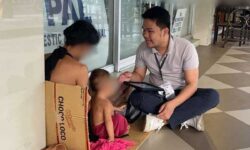
DSWD-Davao launches street dwelling program
THE Department of Social Welfare and Development (DSWD) Office-Davao recently launched a new program to reduce street dwellings and assist individuals and families in finding better housing.
During the Kapehan sa Dabaw event on Monday morning, September 2, 2024, at SM City Davao, Ena Marie T. Monter, Social Welfare Officer II and Pag-abot Focal of DSWD Field Office Davao, introduced the Pag-Abot Program. This flagship program aims to reach out to people living on the streets and provide them with social intervention.
“Ina-address ng ating gobyerno ang homelessness lalo na yung maraming tao na nasa Manila, na nandun na nakatira sa lansangan so ang ginagawa natin 24/7, round the clock po na meron mga social workers, may sasakyan ang DSWD na umiikot sa buong Metro Manila (Our government is addressing homelessness, particularly in Manila where many live on the streets. We operate 24/7 with social workers and DSWD vehicles patrolling Metro Manila),” she said.
Monter said that the program will start with ocular visits, profiling, and data processing of beneficiaries before conducting reach-out activities. Afterward, assessments and service delivery will follow, with monitoring and follow-ups once benefits are provided.
Currently, the office in Davao is receiving beneficiaries referred from Manila. Monter hopes to implement the program regionally soon.
As of now, five beneficiaries have been referred to DSWD-Davao—three families, one individual from Manay, and one from Calinan. They will receive P80,000 in livelihood assistance, employment support, psychosocial aid, and a P70,000 rental subsidy for one year.
The Pag-Abot Program specifically targets street dwellers, unlike the Balik Probinsya program, which was a response to the COVID-19 pandemic aimed at assisting displaced workers returning to their provinces. The Balik Probinsya program has been phased out.
As of August 29, 2024, the Pag-Abot Program has profiled 6,872 beneficiaries, with 2,862 reached across the Philippines. Among them, 73 were admitted to Processing Centers, 475 received Assistance to Individuals in Crisis Situations (AICS), 995 were reintegrated into provinces, 898 were accommodated in Centers and Residential Care Facilities (CRCF), and 1,168 were referred to Local Government Units (LGUs). RGP



